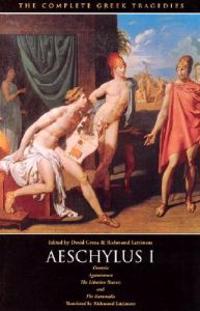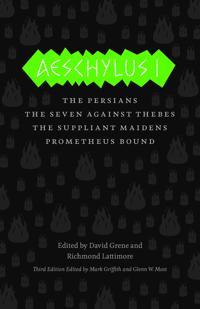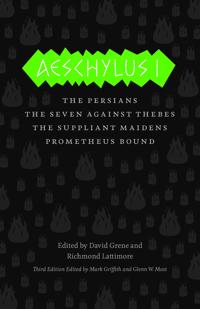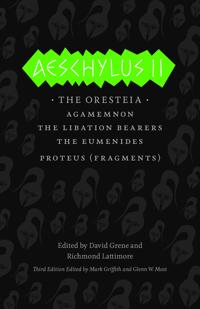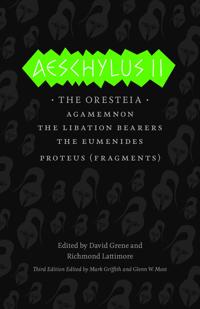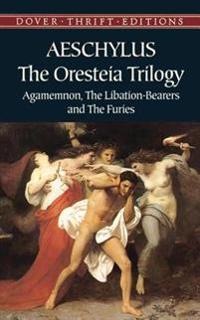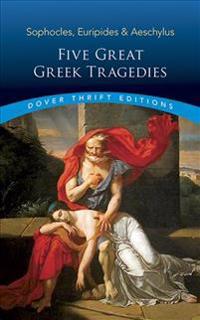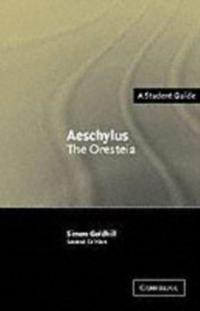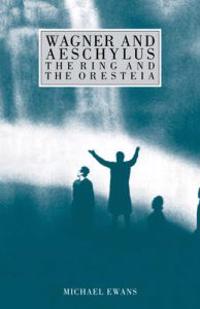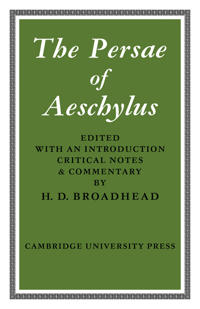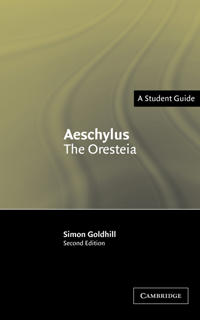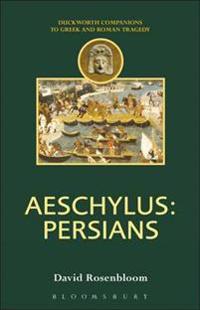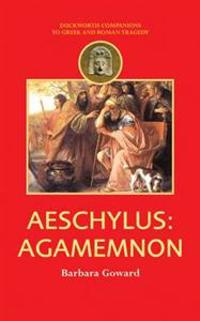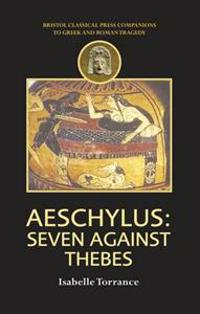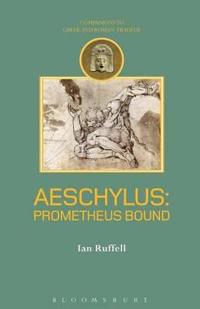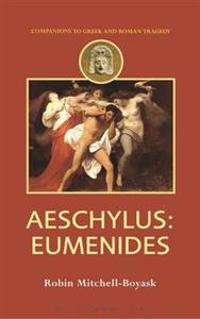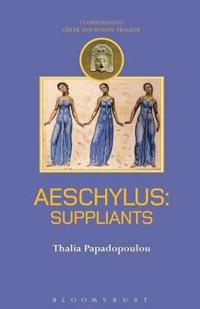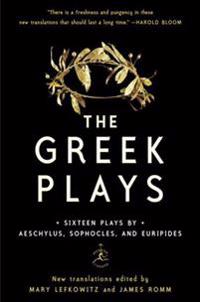The Complete Greek Tragedies (Häftad)
avAeschylus
ISBN: 9780226307787 - UTGIVEN: 196905A brief discussion of the life of Aeschylus and the structure of early tragedy accompanies a translation of the three plays based on H. W. Smyth's Loeb Classical Library text[...]
Aeschylus I
ISBN: 9780226311432 - UTGIVEN: 2013-04Sixty years ago, the University of Chicago Press undertook a momentous project: a new translation of the Greek tragedies that would be the ultimate resource for teachers, students, and readers. They succeeded. Under the expert management of eminent classicists David Grene and Richmond Lattimore, tho[...]
Aeschylus I (Häftad)
ISBN: 9780226311449 - UTGIVEN: 201305Sixty years ago, the University of Chicago Press undertook a momentous project: a new translation of the Greek tragedies that would be the ultimate resource for teachers, students, and readers. They succeeded. Under the expert management of eminent classicists David Grene and Richmond Lattimore, tho[...]
Aeschylus II
ISBN: 9780226311463 - UTGIVEN: 2013-04Sixty years ago, the University of Chicago Press undertook a momentous project: a new translation of the Greek tragedies that would be the ultimate resource for teachers, students, and readers. They succeeded. Under the expert management of eminent classicists David Grene and Richmond Lattimore, tho[...]
Aeschylus II (Häftad)
ISBN: 9780226311470 - UTGIVEN: 201305Sixty years ago, the University of Chicago Press undertook a momentous project: a new translation of the Greek tragedies that would be the ultimate resource for teachers, students, and readers. They succeeded. Under the expert management of eminent classicists David Grene and Richmond Lattimore, tho[...]
Aeschylus
ISBN: 9780300036435 - UTGIVEN: 1986-02Greek dramatist Aeschylus (525-456 BC) is called the creator of the art of tragedy in the Western tradition. Author of "The Persians," "Seven Against Thebes," "The Suppliants," "Oresteia," and "Prometheus Bound." A historical, biographical, and literary study. Hermes series on classical authors.[...]
All That You've Seen Here Is God: New Versions of Four Greek Tragedies Sophocles' Ajax, Philoctetes, Women of Trachis; Aeschylus' Prometheus Bound (häftad)
ISBN: 9780307949738 - UTGIVEN: 2015-09These contemporary translations of four Greek tragedies speak across time and connect readers and audiences with universal themes of war, trauma, suffering, and betrayal. Under the direction of Bryan Doerries, they have been performed for tens of thousands of combat veterans, as well as prison and m[...]
The Oresteia Trilogy (Häftad)
avAeschylus
ISBN: 9780486292427 - UTGIVEN: 1997-01Classic trilogy by great tragedian concerns the bloody history of the House of Atreus. Grand style, rich diction and dramatic dialogue. Still powerful after 2500 years.
[...]Five Great Greek Tragedies (Pocket)
avSophocles (EDT), Euripides (EDT), Aeschylus (EDT)
ISBN: 9780486436203 - UTGIVEN: 2004-06Aeschylus: The Oresteia
ISBN: 9780511162527 - UTGIVEN: 2006-04This is the only general introduction in English to Aeschylus' Oresteia, one of the most important and most influential of all Greek dramas. It discusses the Greek drama festival and the social and political background of Greek tragedy, and offers a reading of this central trilogy. Simon Goldhill fo[...]
Gift of the Nile, The: Hellenizing Egypt from Aeschylus to Alexander (Inbunden)
avPhiroze Vasunia
ISBN: 9780520228207 - UTGIVEN: 2001-11-07The Persae of Aeschylus
ISBN: 9780521118095 - UTGIVEN: 2009-08The Persae is the oldest of surviving plays and its subject matter is unique in ancient drama, since it is concerned with a recent historical event, the defeat of the Persians at Salamis; yet before the publication of this work in 1960, there had been no edition suitable for university students and [...]
Aeschylus (Pocket)
avMark (EDT) Griffith
ISBN: 9780521270113 - UTGIVEN: 1983-05The myth of fire stolen from the gods appears in many pre-industrial societies. In Greek culture Prometheus the fire-stealer figures prominently in the poems of Hesiod, but in Prometheus Bound Hesiod's morality tale has been transformed into a drama of tragic tone and proportions. In the introductio[...]
Aeschylus (Pocket)
avAlan H. (EDT) Sommerstein
ISBN: 9780521284301 - UTGIVEN: 1990-01Professor Sommerstein presents here a freshly constituted text, with introduction and commentary, of Eumenides, the final play in Aeschylus' Oresteia trilogy.[...]
Aeschylus: The Oresteia (Häftad)
avSimon Goldhill
ISBN: 9780521539814 - UTGIVEN: 200401This is the only general introduction in English to Aeschylusâ Oresteia, one of the most important and most influential of all Greek dramas. It discusses the Greek drama festival and the social and political background of Greek tragedy, and offers a reading of this central trilogy. Simon Goldhi[...]
Aeschylus
ISBN: 9780521832298 - UTGIVEN: 2004-01This is the only general introduction in English to Aeschylus' Oresteia, one of the most important and most influential of all Greek dramas. It discusses the Greek drama festival and the social and political background of Greek tragedy, and offers a reading of this central trilogy. Simon Goldhill fo[...]
Aeschylus (häftad)
ISBN: 9780691607337 - UTGIVEN: 2014-07An extraordinary drama of flight and rescue arising from women's resistance to marriage, The Suppliants is surprising both for its exotic color and for its forceful enactment of the primal struggle between male and female, lust and terror, brutality and cunning. In his translation of this ancient Gr[...]
Aeschylus (Häftad)
avDuckworth Companions to Greek & Roman Tragedy
ISBN: 9780715632864 - UTGIVEN: 200701Aeschylus' Persians is the earliest extant Greek tragedy and sole surviving historical tragedy. Produced in 472 BC, the play tells the story of the defeat of the Persian king Xerxes in his attempt to expand his empire by conquering Greece and his return in rags to Persia to face the condemnation of [...]
Aeschylus (Inbunden)
avBarbara Goward
ISBN: 9780715633854 - UTGIVEN: 200509Aeschylus' Agamemnon, opening play of the Oresteia trilogy, with its brilliant theatrical effects, is a masterpiece. The revenge plot - a murder - is simple, the language and imagery complex and thrilling. The play features two extraordinary women: the powerful, dissembling queen Clytemnestra and th[...]
Aeschylus (Häftad)
avIsabelle Torrance
ISBN: 9780715634660 - UTGIVEN: 200708Accessible introductions to ancient tragedies. Each volume discusses the main themes of a play and the central developments in modern criticism, while also addressing the play's historical context and the history of its performance and adaptation.One of our earliest surviving Greek tragedies, Aeschy[...]
Aeschylus: Prometheus Bound (Häftad)
avIan Ruffell
ISBN: 9780715634769 - UTGIVEN: 201110Prometheus Bound is a play beloved of revolutionaries, romantics and rebels, with a fierce optimism tempered by an acute awareness of the compromises, dangers and obsessions of political action. This companion sets the play in its historical context, explores its challenge to authority, and traces i[...]
Aeschylus (Häftad)
avRobin Mitchell-Boyask
ISBN: 9780715636428 - UTGIVEN: 200911The "Eumenides", the concluding drama in Aeschylus' sole surviving trilogy, the "Oresteia", is not only one of the most admired Greek tragedies, but also one of the most controversial and contested, both to specialist scholars and public intellectuals. It stands at the crux of the controversies over[...]
Aeschylus (Häftad)
avThalia Papadopoulou
ISBN: 9780715639139 - UTGIVEN: 201101Aeschylus' 'Suppliants' dramatises the myth of the fifty daughters of Danaos, who flee Egypt and come to Argos as suppliants, trying to escape forced marriage to their Egyptian cousins. It was long considered to be the earliest surviving tragedy. Even after the mid-20th century, when new evidence es[...]
Greek Plays: Sixteen Plays by Aeschylus, Sophocles, and Euripides (häftad)
ISBN: 9780812983098 - UTGIVEN: 2017-09A landmark anthology of the masterpieces of Greek drama, featuring all-new, highly accessible translations of some of the world's most beloved plays, including Agamemnon, Prometheus Bound, Bacchae, Electra, Medea, Antigone, and Oedipus the King The great plays of Ancient Greece are among the most e[...]

